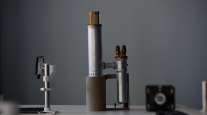Alphabet, Chipotle Test Burrito Drone Delivery at Virginia Tech

In what’s sure to be a college student’s dream come true, drones soon will be delivering burritos on the campus of Virginia Tech.
The experimental service, to begin this month and last a few weeks, is a test by Project Wing, a unit of Google’s parent company, Alphabet Inc. Chipotle Mexican Grill Inc. and the Blacksburg, Virginia, university have agreed to participate.
The Federal Aviation Administration approved the venture, the most extensive test yet in the United States of what many companies — including Amazon.com Inc. and Wal-Mart Stores Inc. — hope will eventually become routine drone deliveries of products. Amazon has begun a round of trials at a location in the United Kingdom.
"It’s the first time that we’re actually out there delivering stuff to people who want that stuff,” said Dave Vos, who heads Project Wing.
Project Wing will use self-guided hybrids that can fly like a plane or hover like a helicopter. They will make deliveries from a Chipotle food truck to assess the accuracy of navigation systems and how people respond.
The devices will hover overhead and lower the Chipotle edibles with a winch.
RELATED: Google's Project Wing delivery drone to be tested at US site
Part of the experiment will be to see how well the packaging protects the chow and keeps it warm. Food was selected as the demonstration cargo because it’s a challenge. The company already is at work on a more sophisticated second version of the aircraft that won’t be used in the tests, Vos said.
Before widespread deliveries can occur, companies will have to convince FAA that drones can avoid each other and safely navigate to drop spots using robotic technology. The agency on Aug. 29 instituted broad new regulations for commercial drones. While companies hope the rules will clear the way for drone deliveries, they didn’t permit such flights initially.
RELATED: Landmark rule opens skies to more commercial drones
The burrito-bearing aircraft will be flown by automation, but human pilots will be standing by to take control if necessary to comply with FAA rules, Vos said. Because regulations also don’t allow drones to fly over people, participants will be shielded, according to the company.
 Patrick T. Fallon/Bloomberg
Patrick T. Fallon/BloombergVos said the experiment will not assess one of the major technology hurdles facing drone deliveries: creation of a low-level air-traffic system that can maintain order as the skies become more crowded with unmanned vehicles. NASA is working with Project Wing and other companies to develop the framework for such a system.
Data from the tests will be provided to FAA to help the agency develop new rules allowing deliveries, Vos said.
Alphabet sees the technology as potentially creating sweeping changes to society and the economy. It would not only reduce carbon emissions, but may change the way consumers shop, the company said in a statement.
The project is part of Virginia Tech’s efforts to become a leader in new transportation technology, school President Timothy Sands said in an interview.
“It sounds simple, but it’s not,” Sands said. “There are a lot of things to work out from a safety point of view and a policy point of view.”
The university is part of the Mid-Atlantic Aviation Partnership, one of six groups chosen as unmanned test beds by FAA.
The volunteers ordering drone-delivery food will be made up of a mix of Virginia Tech employees, students and possibly other recruits, said Mark Blanks, director of the partnership.
“This is the most complex delivery flight operation that I am aware of that’s occurred on U.S. soil,” Blanks said.


